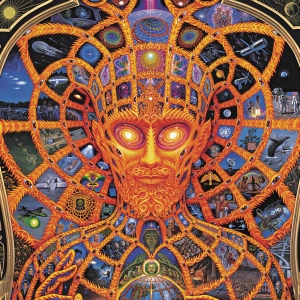What do kaleidoscopes of all things have to do with theology? At first glance they may seem opposite. Kaleidoscopes are psychedelic, colourful, and fun; theology might bring up thoughts of a dusty old tome full of depressing and boring facts. It shouldn’t be that way though. The reason that theology can have negative connotations is that many theologians, especially in the Western world, have made it seem like a giant, boring legal contract between an angry God and His people who He is always on the verge of throwing in Hell for any infraction of the fine print of this contract. Another negative trend has been the attempt to try to understand every mystery in the Bible and resolve every paradox. Perhaps they weren’t meant to be grasped in a complete, cut-and-dried fashion as much as they were meant to be perceived sufficiently, experienced, and reveled in.
Think of a kaleidoscope, a pattern of shapes and colours occurring in a non-linear format. Consider each shape and colour as an aspect, theme, truth, or motif of the gospel. As there are patterns and structures in kaleidoscopes, there are also patterns and structures to the message of the Bible; the gospel is not the grab-bag spirituality of our age that pretends to make no truth or morality claims and offers wishy-washy spiritual principles. Yet the pattern is above the human attempts to organize it in a rationalistic manner. There is the story of God as the righteous judge, the loving father, the enlightening spirit, the great physician, the conquering king, and the pursuing lover. Obviously these are metaphors that shine light on the mystery of the gospel, but they don’t mesh at all points. If God was a literal father, a literal doctor, and a literal lover that would make him an incestuous physician with a very inappropriate relationship with his clients.
These analogies and metaphors used to teach spiritual truth sometimes clash because they are not straightforward statements but pictures that gives us glimpses at truths too sublime for words alone. Analogies are always used to demonstrate some aspects of a mysterious thing, not to describe it exhaustively. It is easy to make the mistake of applying all aspects of an analogy to the thing it is trying to describe, which defeats the purpose of the analogy, because it would then become the thing it is trying to describe. When multiple analogies are stretched, the conclusions can seem contradictory and there are disagreements about which analogy is authoritative and which is subject (ie is God first and foremost to be understood as a father or first and foremost to be understood as a judge? or both? Or certain aspects of each one?) We should not try to contain God in a box based upon the limits of our understanding, but accept all the metaphors, paradoxes, and mysteries as one mystical whole. Kaleidoscopic theology contains all the aspects of the gospel and looks at them in awe and wonder.
Consider the paradox of free will and sovereignty; we have free will, yet God is in control, how does that work? Or the trinity: how can God be both 3 and 1? The incarnation of Christ may be the biggest mystery of all. God being joined with a human through a miraculous conception. Let’s not be too fast to break out the Venn diagram or put God in a petri dish. We proponents of Kaleidoscopic theology certainly wrestle to approximate the truth, but ultimately we say “I don’t know man, but it’s pretty freaking cool”. So called intellectuals may scoff at this way of thinking, but Jesus said “You have hidden these things from the wise and learned and revealed them to little children.” St. Paul also said ” The person without the Spirit does not accept the things that come from the Spirit of God but considers them foolishness, and cannot understand them because they are discerned only through the Spirit.” Clearly reason and intellect can only take use so far in understanding spiritual realities.
In his article on Kaleidoscopic theology (In the Book Nature of the Atonement: 4 Views), Joel Green noted, ” A close reading of the New Testament supports two indisputable and intimately linked claims about the crucifixion of Jesus of Nazareth. The first is that Jesus’ demise at the hands of Roman justice, represented theologically in the motto ‘Christ Crucified’, is the means of comprehending the eternal purpose of God, as this is known in Israel’s scriptures. The second is that the significance of Jesus’ death is woven so tightly into the fabric of God’s purpose that we may never exhaust the many ways of articulating its meaning for our salvation.” These many ways are the various patterns and colours of the kaleidoscope. Green continues, ” So limited is the ground on which we walk and so infinite the mystery of God’s saving work that we need many interpretive images, many tones [or colours], many voices” Some have taken one of these interpretive images and declared that it was the only or central way to understand the life and death of Jesus. These images are called atonement theories, and while there are ones I favor more than others. I am more dedicated to the mystery that is Christ (who is the Truth), than to a theological system of my interpretation. God is the kaleidoscope that I cannot grasp, I approximate his truth as best as I can, but at the end of the day I enjoy the show. I cannot connect all the dots honestly and it is time that we in the Western church learn to appreciate mystery.
I also like the idea of a prism as an analogy of the gospel message; the white light beam is the “eternal purpose of God” or the saving act of Jesus Christ and it goes through the prism of language and culture to reveal its many beautiful layers. You see, the gospel is not the depressing legal contract between humans and an angry God. God was never against you and the gospel is anything but boring and depressing. That is why kaleidoscope is such a fitting word to describe the gospel and God himself. The one who created lights, music, puffins, stars, raspberries, and colours is anything but boring. Evangelist Todd Bentley described a time when he saw a vision of Jesus as a kaleidoscope (The Reality of the Supernatural World).So join me as I write more mind expanding articles to explore the meaning of the Gospel and the person of God; it’ll be a trip!

